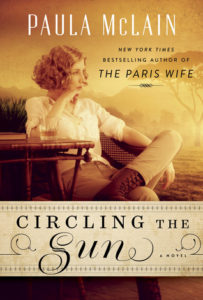 For this edition of our virtual book club, we’re discussing Circling the Sun by Paula McLain. It’s easy to participate: just add your thoughts about the discussion questions (or anything else you’d like to talk about) in the comment section below.
For this edition of our virtual book club, we’re discussing Circling the Sun by Paula McLain. It’s easy to participate: just add your thoughts about the discussion questions (or anything else you’d like to talk about) in the comment section below.
This book started out with so much promise: it’s beautifully written, and the scenes of the Kenyan landscape come to life off the pages. I also found myself intrigued by a time and place I didn’t know much about: 1920s colonial Kenya. Unfortunately, there was one significant deal breaker for me: I just didn’t like the main character. It was painful to watch Beryl make choice after choice that imploded her life, and after a while, even though I felt sorry for her, I just couldn’t bring myself to keep cheering for her. I slogged my way through the second half of the book.
Discussion #1: Beryl as a flawed character
What intrigued me most when I picked up this book was the angle of Beryl’s cross-cultural experiences, as well as her accomplishments as a woman in the ’20s. She made history as a racehorse trainer and a pilot—two professions that were pretty countercultural for a woman of her time. But so much of the book focused on her affairs and poor relational choices that those events overshadowed the rest of her story.
“We’re all of us afraid of many things, but if you make yourself smaller or let your fear confine you, then you really aren’t your own person at all—are you? The real question is whether or not you will risk what it takes to be happy.”
The irony is that Beryl risks everything to find happiness but ends up profoundly unhappy. I’m not sure she ever comes to realize she’s been chasing the wrong things all along.
What did you think of Beryl? Did you find her likable? Sympathetic? Do you know anyone like her?
Discussion #2: Beryl’s mother issues
I did find one reason to feel sympathetic toward Beryl: she was abandoned by her mother as a child, and that must leave an indelible scar on a person. The tragedy, of course, is that the crippling event of her life (losing her mother) is almost precisely what she ends up doing to her own child.
Even so, Beryl seems to think that her upbringing wasn’t a disadvantage but rather made her tough:
“I’ve sometimes thought that being loved a little less than others can actually make a person, rather than ruin them.”
Do you think being “loved a little less” is a benefit or a disadvantage? Do you think it’s possible to break the cycle of a lack of love?
Discussion #3: Interesting genre
I give the author credit for tackling a unique style of literature: she essentially fictionalized Beryl Markham’s memoir, which was originally published in 1942. Markham’s book, West with the Night, didn’t make much of a splash when it first came out, but in the 1980s, someone discovered a letter from Ernest Hemingway with this praise for her work: “It really is a bloody wonderful book.” The book was republished in 1983 and became a bestseller, and now Paula McLain has expanded and fictionalized the work. I didn’t realize until after I’d read it that Baroness Karen von Blixen is actually Isak Dinesen, who wrote Out of Africa.
Perhaps McLain stayed true to Markham’s personality and life experiences, but I found myself wishing that she’d created a protagonist who was more likable—or at least more sympathetic. Ultimately, Beryl was a tragic figure, but I’m not sure I would have chosen her as a subject for a novel.
“We had both tried for the sun, and had fallen, lurching to earth again, tasting melted wax and sorrow.”
In what ways do you think Beryl’s life might have turned out differently if she’d lived in a different time or place? Do you think you would have been friends with her?
Rating:
I would give this book two stars (out of five). Despite the quality writing, I just couldn’t invest in the main character enough to want to follow her journey page after page.
How many stars would you give this book?
***
Remember: I’ll give away a free book to one lucky commenter! Just write a comment below to be eligible to win.
